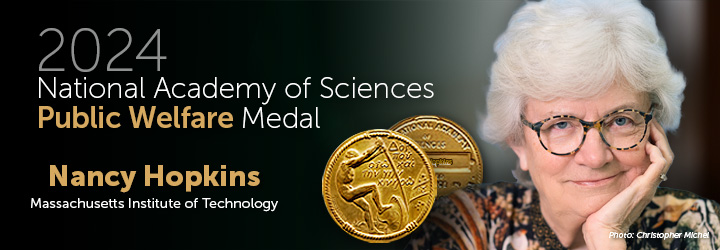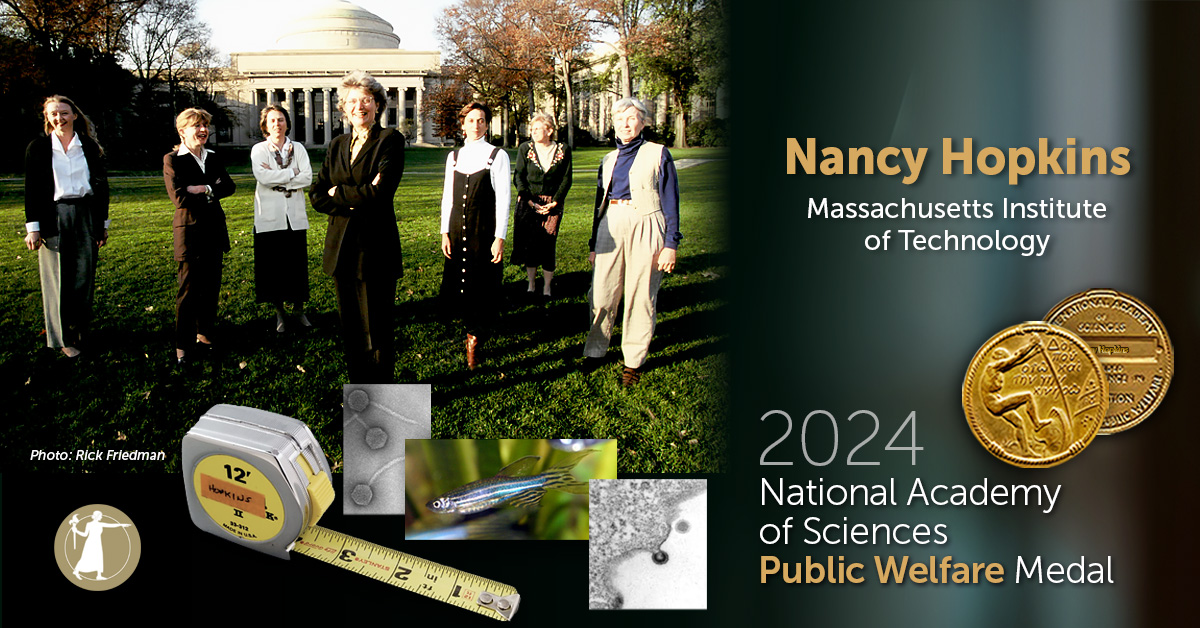Hopkins-PWM-Banner

Join us in congratulating Nancy Hopkins! 
The National Academy of Sciences is presenting its 2024 Public Welfare Medal to molecular biologist and women’s equality advocate Nancy Hopkins for her courageous leadership over three decades to create and ensure equal opportunity for women in science. The medal is the Academy’s most prestigious award, established in 1914 and presented annually to honor extraordinary use of science for the public good.
During her time at the Massachusetts Institute of Technology — where she worked as a professor of biology in the Center for Cancer Research for 40 years before her retirement in 2014 — Hopkins brought national attention to obstacles facing women in the scientific workforce. She joined the center as one of its first faculty members in 1973, and over the next two decades, she became aware of differences in the experiences and opportunities of tenured male and female professors. In 1994, Hopkins and 15 other tenured women joined forces to present the problem to MIT’s dean of science, describing it as marginalization and possibly undervaluation of women compared to men of equal or lesser accomplishment.
The dean formed a committee — chaired by Hopkins and consisting of women faculty and several male department heads, one a Nobel laureate — to study the problem. The committee used a data-driven approach and extensive interviews to examine the professional experiences of women over the course of their careers in multiple fields and six departments of science at MIT. The analysis revealed discrepancies in compensation, rewards, research resources, lab space, teaching assignments, and key administrative opportunities between men and women of equal accomplishment. Using the committee’s detailed confidential report, the dean corrected documented inequities. At the request of the chair of the MIT faculty, a short summary of the findings was made public in 1999 and was endorsed by MIT’s president.
The report was covered by national media outlets and shined a spotlight on the unequal treatment of women in science. An overwhelming public response revealed that the problems were widespread in STEM and other fields in academia as well as other professional settings. MIT’s president and provost requested similar studies be done in all academic departments of MIT. Based on the findings, the university implemented changes in hiring practices, built day care facilities on campus, revised family leave policies, and revisited pay equity reviews and other areas to improve the status and working environment of its women faculty. In addition, the presidents of eight other research universities met at MIT to compare data and relevant policies from their schools. Hopkins also advised the National Science Foundation on designing data-driven studies to ensure equity for women faculty and help women in science and engineering realize their potential.
Recognizing the impact of her work on equal opportunity for women, MIT tasked Hopkins with co-chairing a new diversity council at the university with MIT’s provost. Hopkins advocated for extending the council to examine obstacles faced by faculty of color, specifically including women faculty of color, and solicited recommendations on how to improve hiring practices and retention among diverse faculty.
“Nancy Hopkins did not intend to be a trailblazer — she just wanted to be a scientist,” said Nancy Andrews, home secretary of the National Academy of Sciences and chair of the selection committee for the award. “But she recognized that women faculty weren’t receiving the same resources and opportunities as their male peers. Her leadership in revealing discrimination at MIT, and MIT’s courage in acknowledging it, were giant steps towards leveling the playing field for women in science.”
“In her use of evidence to ferret out inequality in opportunity, Nancy Hopkins has helped create pathways to success for women and minorities in science — not only for those of her own generation, but for generations to come,” said National Academy of Sciences President Marcia McNutt. “The scientific enterprise thrives when it employs the best and brightest minds from all quarters of society, and Nancy’s work has done much to ensure that all talented scientists are given the opportunities they deserve to reach the highest echelons of scientific achievement.”
In addition to advocating for equality in science for women and minorities, Hopkins is an accomplished scientist whose career included breakthroughs in cancer research and molecular biology. Hopkins received her B.A. from Radcliffe College in 1964 and her Ph.D. from the Department of Molecular Biology and Biochemistry at Harvard University in 1971, where she contributed to research showing that a protein encoded by a bacterial virus binds to DNA to control gene expression. When she joined MIT in 1973, she mapped genes in RNA tumor viruses to reveal insights into their role in causing cancer. In 1989, Hopkins switched fields and developed molecular technologies for working with zebrafish, which has become a premier model system for understanding vertebrate development and cancer biology.
The author of numerous articles and co-author of an edition of the textbook, The Molecular Biology of the Gene, Hopkins is the recipient of many awards and honors for both her scientific achievements and her work on gender issues. For her professional accomplishments, she has been awarded the University of California San Francisco Medal, the Radcliffe Institute Graduate Medal, the Gordon Y. Billard Award for “special service” to MIT, the Centennial Medal from Harvard University, the George Streisinger Award from the International Zebrafish Society, and the STAT Biomedical Innovation Award, among others. For her advocacy work, she has received the Diversity Leadership Award from WTS-Boston, the Beacon Award from the Trustees Council of Penn Women, the Laya Wiesner Community Award from MIT, the Maria Mitchell Women in Science Award, the AACR Women in Cancer Research Award, and the Gladstone Leadership Award for Promoting Diversity in Science Medicine among numerous other honors.
Hopkins chaired or served on several National Academies study committees — including the committee that produced a 2007 report on maximizing the potential of women in science. She is a member of the National Academy of Sciences, the National Academy of Medicine, the American Academy of Arts and Sciences, and the AACR Academy. She holds honorary doctorates from Smith College; Worcester Polytechnic Institute; Mt. Sinai School of Medicine; Boston University; Trinity College, Dublin; The Rockefeller University; Hong Kong University of Science and Technology; and the Weizmann Institute. In 2019, Hopkins along with MIT President emerita Susan Hockfield and MIT Professor Sangeeta Bhatia, spearheaded the Boston Biotech Working Group with the American Academy of Arts and Sciences to study the inclusion of women as founders and board members of biotech companies in Massachusetts. As a result, several venture capital firms pledged to aim for boards that include numbers of women reflecting the relevant pipelines, and MIT established fellowship programs for women faculty interested in founding their own biotech companies.
The Public Welfare Medal will be presented to Hopkins on April 28 during the Academy’s 161st annual meeting.
The NAS Public Welfare Medal is the Academy's most prestigious award, established in 1914 and presented annually to honor extraordinary use of science for the public good.
Please use the following sample social media posts and other materials to congratulate Nancy Hopkins.
Facebook - copy the text and click on the Facebook button to share
![]() Congratulations to Nancy Hopkins of Massachusetts Institute of Technology, winner of the 2024 National Academy of Sciences’ Public Welfare Medal for her courageous leadership over three decades in illuminating the unequal treatment of women in science, and efforts to create and ensure equal opportunity! The NAS Public Welfare Medal is the Academy's most prestigious award and is presented annually to honor extraordinary use of science for the public good.
Congratulations to Nancy Hopkins of Massachusetts Institute of Technology, winner of the 2024 National Academy of Sciences’ Public Welfare Medal for her courageous leadership over three decades in illuminating the unequal treatment of women in science, and efforts to create and ensure equal opportunity! The NAS Public Welfare Medal is the Academy's most prestigious award and is presented annually to honor extraordinary use of science for the public good.
Twitter - click on the Twitter button to share
![]() Congratulations to Nancy Hopkins of @MIT, winner of the 2024 @theNASciences Public Welfare Medal for her courageous leadership over three decades in illuminating the unequal treatment of women in science, and efforts to create and ensure equal opportunity! #NASaward #academia #publicgood
Congratulations to Nancy Hopkins of @MIT, winner of the 2024 @theNASciences Public Welfare Medal for her courageous leadership over three decades in illuminating the unequal treatment of women in science, and efforts to create and ensure equal opportunity! #NASaward #academia #publicgood
Graphic - save the image to accompany your post


